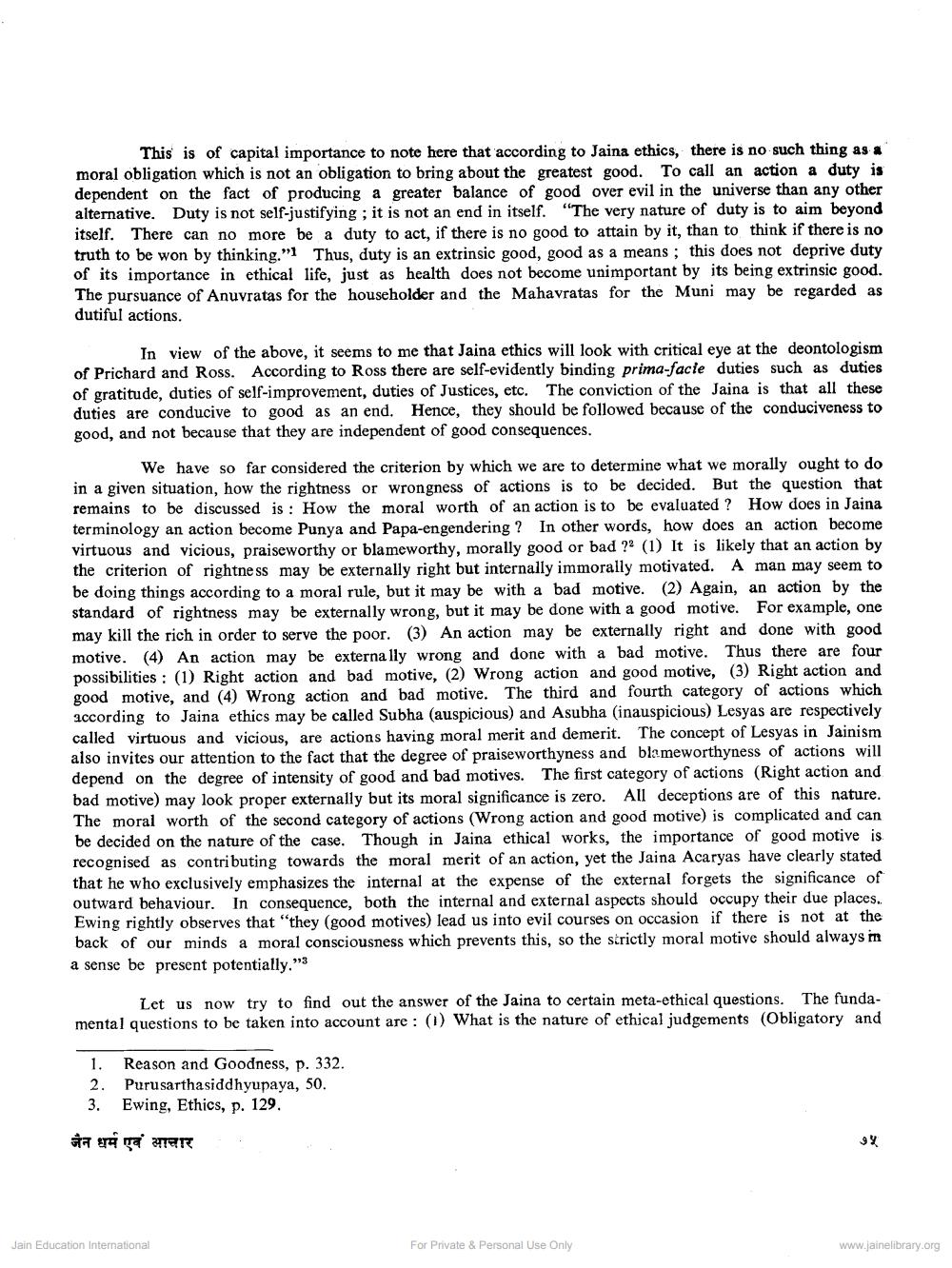Book Title: Jaina Ethical Theory Author(s): Kamalchand Sogani Publisher: Z_Deshbhushanji_Maharaj_Abhinandan_Granth_012045.pdf View full book textPage 3
________________ This is of capital importance to note here that according to Jaina ethics, there is no such thing as a moral obligation which is not an obligation to bring about the greatest good. To call an action a duty is dependent on the fact of producing a greater balance of good over evil in the universe than any other alternative. Duty is not self-justifying; it is not an end in itself. "The very nature of duty is to aim beyond itself. There can no more be a duty to act, if there is no good to attain by it, than to think if there is no truth to be won by thinking." Thus, duty is an extrinsic good, good as a means; this does not deprive duty of its importance in ethical life, just as health does not become unimportant by its being extrinsic good. The pursuance of Anuvratas for the householder and the Mahavratas for the Muni may be regarded as dutiful actions. In view of the above, it seems to me that Jaina ethics will look with critical eye at the deontologism of Prichard and Ross. According to Ross there are self-evidently binding prima-facie duties such as duties of gratitude, duties of self-improvement, duties of Justices, etc. The conviction of the Jaina is that all these duties are conducive to good as an end. Hence, they should be followed because of the conduciveness to good, and not because that they are independent of good consequences. We have so far considered the criterion by which we are to determine what we morally ought to do in a given situation, how the rightness or wrongness of actions is to be decided. But the question that remains to be discussed is: How the moral worth of an action is to be evaluated? How does in Jaina terminology an action become Punya and Papa-engendering? In other words, how does an action become virtuous and vicious, praiseworthy or blameworthy, morally good or bad ?2 (1) It is likely that an action by the criterion of rightness may be externally right but internally immorally motivated. A man may seem to be doing things according to a moral rule, but it may be with a bad motive. (2) Again, an action by the standard of rightness may be externally wrong, but it may be done with a good motive. For example, one may kill the rich in order to serve the poor. (3) An action may be externally right and done with good motive. (4) An action may be externally wrong and done with a bad motive. Thus there are four possibilities: (1) Right action and bad motive, (2) Wrong action and good motive, (3) Right action and good motive, and (4) Wrong action and bad motive. The third and fourth category of actions which according to Jaina ethics may be called Subha (auspicious) and Asubha (inauspicious) Lesyas are respectively called virtuous and vicious, are actions having moral merit and demerit. The concept of Lesyas in Jainism also invites our attention to the fact that the degree of praiseworthyness and blameworthyness of actions will depend on the degree of intensity of good and bad motives. The first category of actions (Right action and bad motive) may look proper externally but its moral significance is zero. All deceptions are of this nature. The moral worth of the second category of actions (Wrong action and good motive) is complicated and can be decided on the nature of the case. Though in Jaina ethical works, the importance of good motive is recognised as contributing towards the moral merit of an action, yet the Jaina Acaryas have clearly stated that he who exclusively emphasizes the internal at the expense of the external forgets the significance of outward behaviour. In consequence, both the internal and external aspects should occupy their due places.. Ewing rightly observes that "they (good motives) lead us into evil courses on occasion if there is not at the back of our minds a moral consciousness which prevents this, so the strictly moral motive should always in a sense be present potentially."3 Let us now try to find out the answer of the Jaina to certain meta-ethical questions. The fundamental questions to be taken into account are: (1) What is the nature of ethical judgements (Obligatory and 1. Reason and Goodness, p. 332. Purusarthasiddhyupaya, 50. 2. Ewing, Ethics, p. 129. 3. जैन धर्म एवं आचार Jain Education International For Private & Personal Use Only ७५ www.jainelibrary.orgPage Navigation
1 2 3 4 5 6 7 8 9 10 11 12
